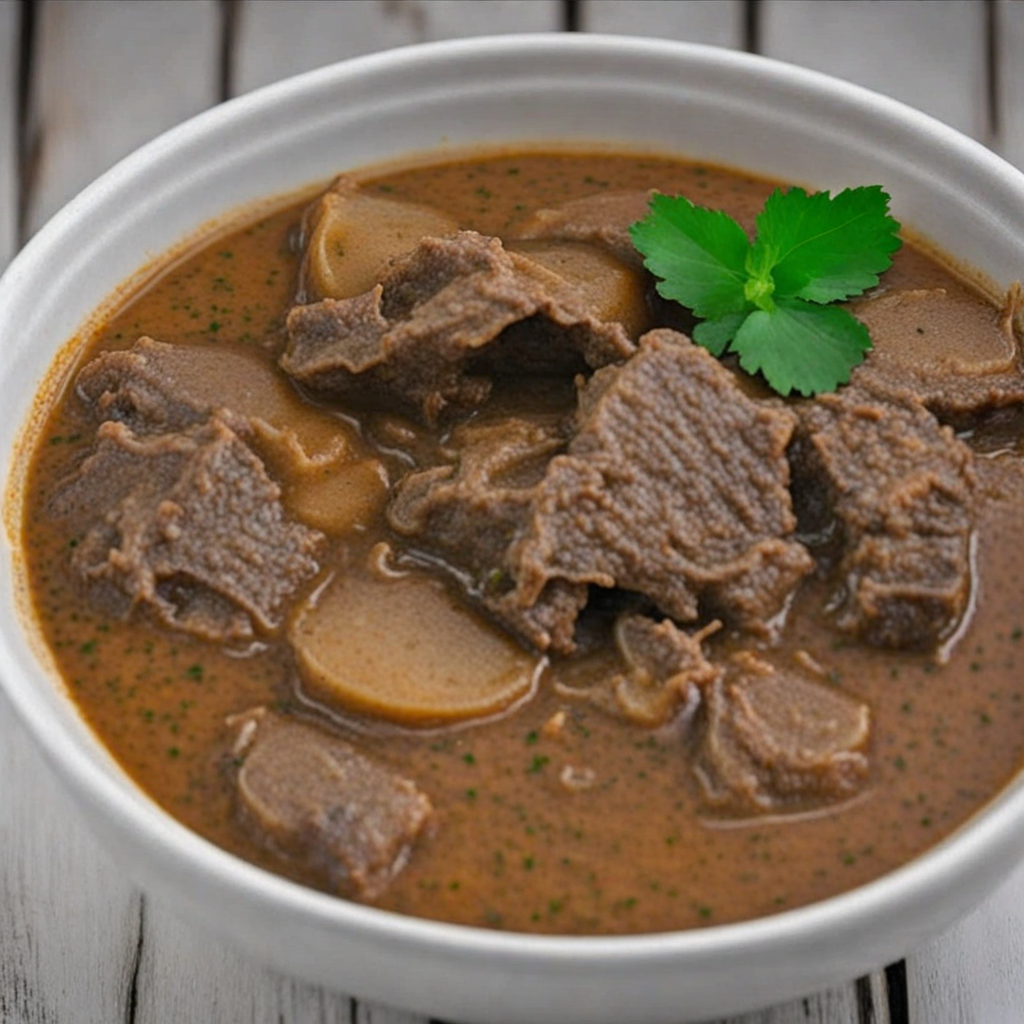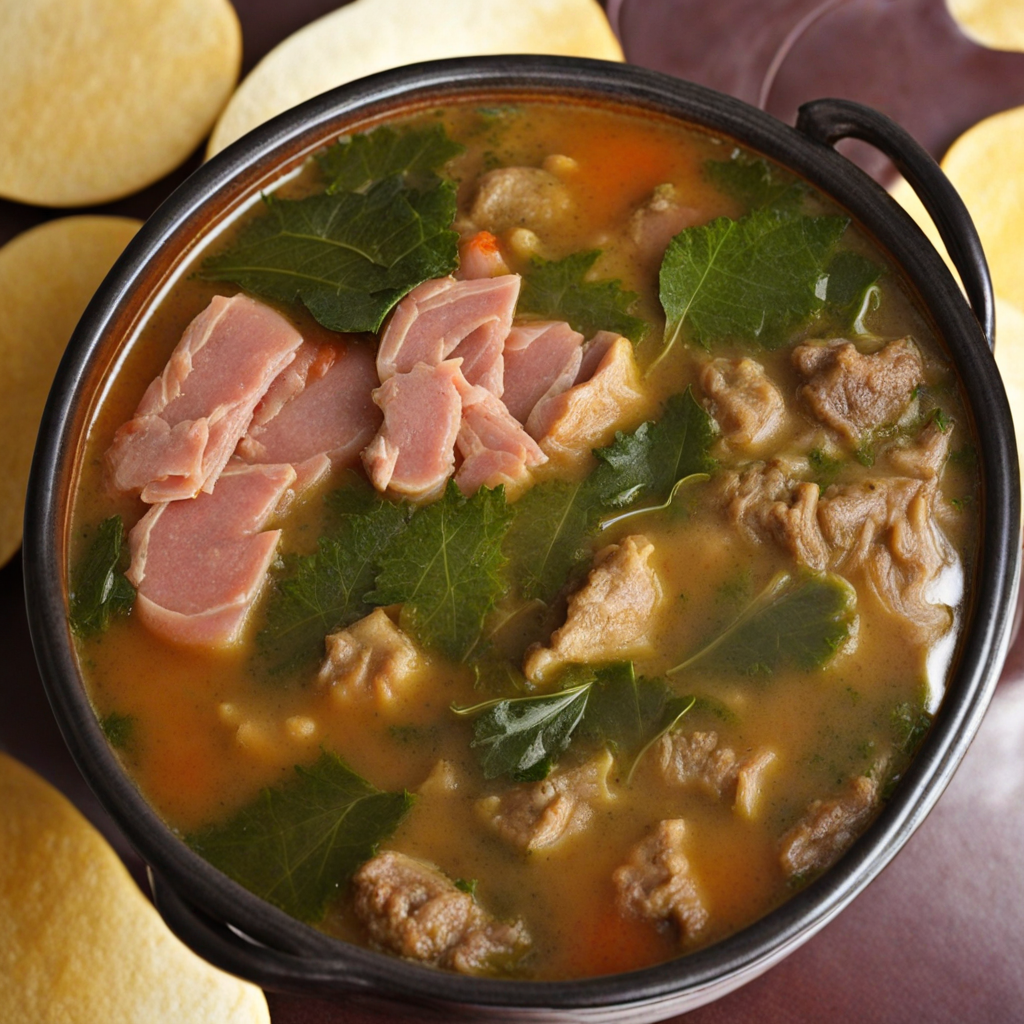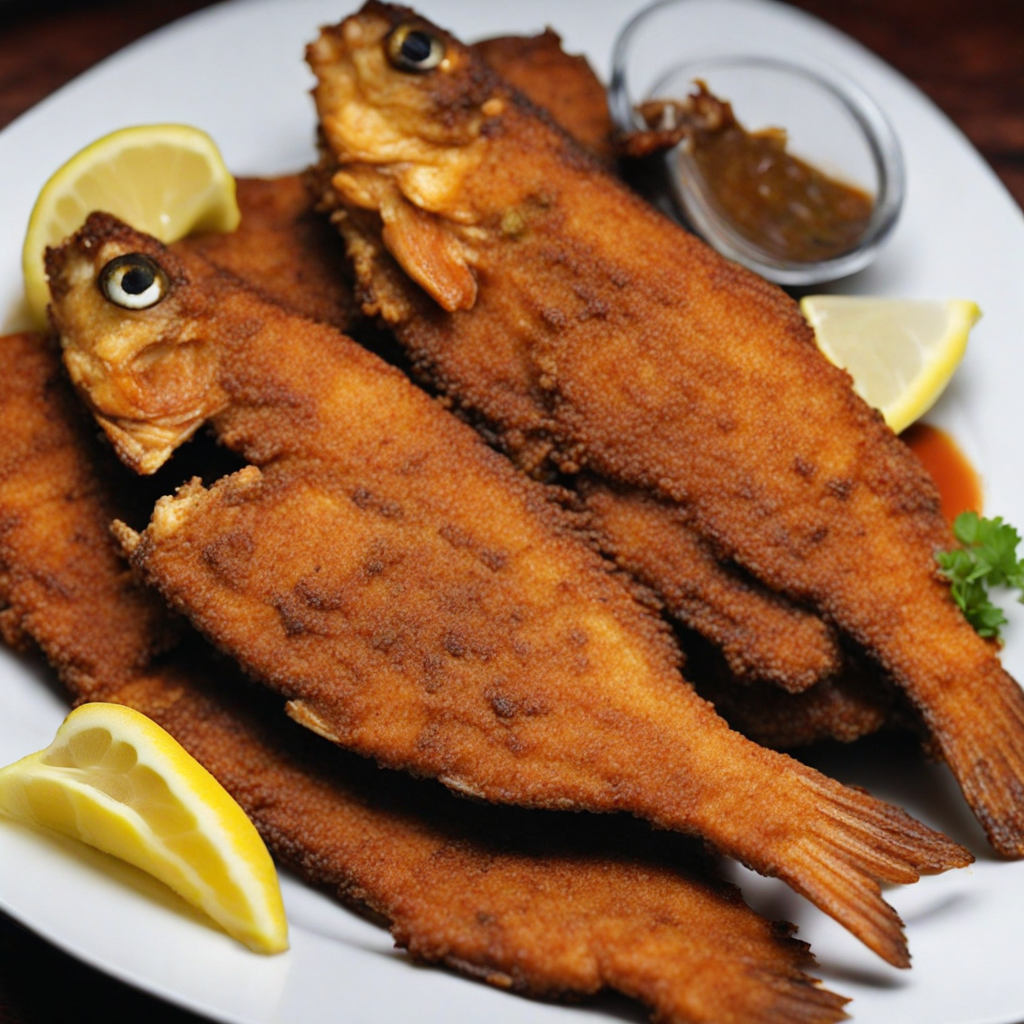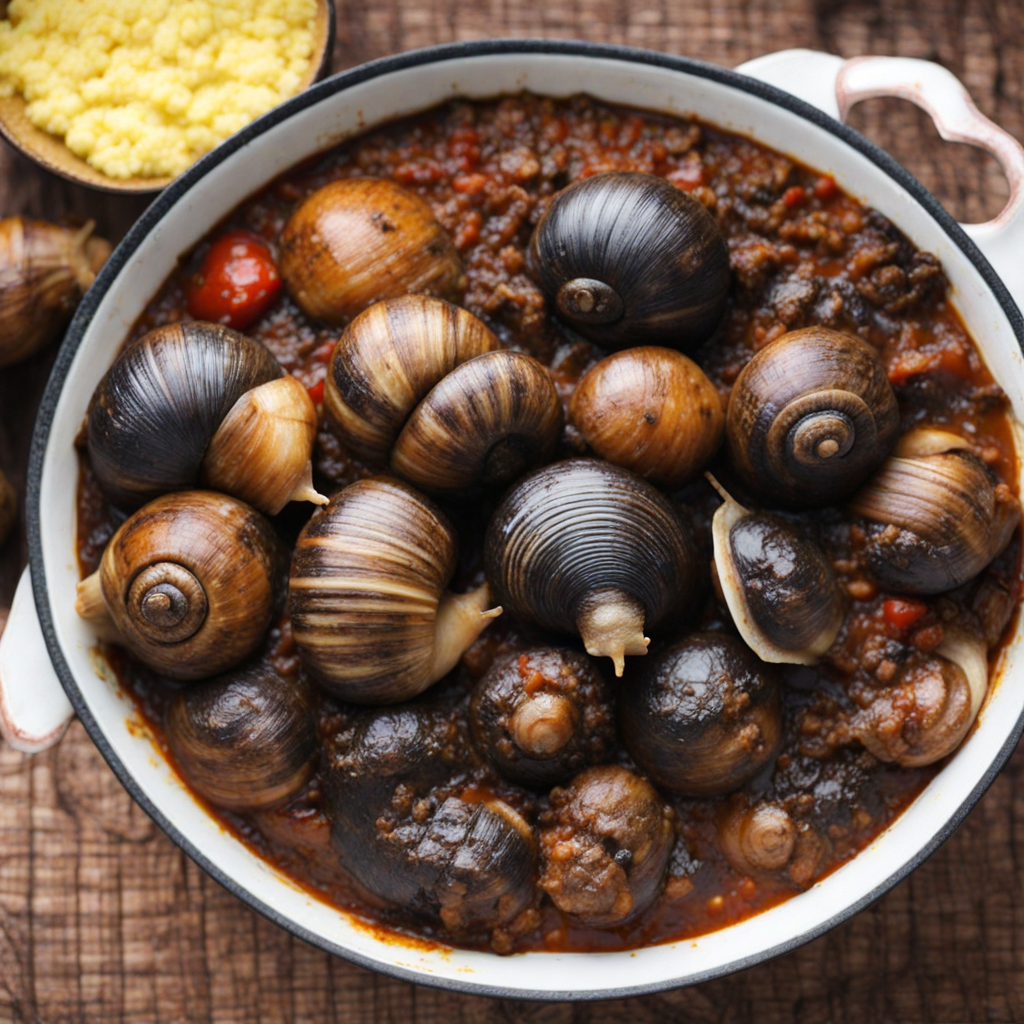Goat Meat Pepper Soup
Goat Meat Pepper Soup is a tantalizing dish that embodies the rich culinary heritage of Nigeria. This spicy soup is made primarily with tender goat meat, which is known for its robust flavor and unique texture. The goat meat is typically cooked until it is tender, allowing it to absorb the aromatic spices and herbs that are essential to this dish. The addition of spices like pepper, ginger, and local herbs creates a fragrant broth that is both warming and invigorating, making it a popular choice for gatherings and celebrations. The soup's heat comes primarily from the use of a variety of peppers, often a mix of scotch bonnet and other local varieties, which provide a fiery kick that complements the earthiness of the goat meat. The dish is usually seasoned with traditional Nigerian ingredients like uziza seeds, which add a slightly peppery and nutty flavor, and calabash nutmeg, known for its distinctive aroma. The combination of these spices results in a complex, layered flavor profile that is both spicy and aromatic, making every sip a delightful experience. Often served in a communal pot, Goat Meat Pepper Soup is typically enjoyed as an appetizer or a main dish, accompanied by sides such as rice or yam. It is not only a comfort food but also a dish that brings people together, often enjoyed during social gatherings or family celebrations. The warm, spicy broth is perfect for warming up on a cool evening or for soothing colds, adding to its reputation as a beloved staple in Nigerian cuisine. Each bowl offers a taste of tradition, culture, and the vibrant flavors of Nigeria.
How It Became This Dish
The Rich History of Goat Meat Pepper Soup in Nigeria #### Origins Goat meat pepper soup, a beloved dish in Nigeria, has deep roots in the country's culinary heritage. The origins of this spicy soup can be traced back to the various ethnic groups that inhabit Nigeria, each contributing their unique flavors and cooking methods. Goat meat, known locally as "mutton" or "goat," has been a staple protein source for centuries, particularly in rural communities where goats are more accessible than larger livestock. Historically, goats have been significant in West African culture, often seen as symbols of wealth and status. They are relatively easy to rear and require less space and feed compared to cattle, making them a popular choice among farmers. The practice of consuming goat meat is believed to date back to ancient times when hunting and farming communities relied on this versatile animal for sustenance. #### Cultural Significance In Nigerian culture, goat meat pepper soup is more than just a meal; it is a symbolic dish that plays a significant role in social gatherings, celebrations, and rituals. It is commonly served at festive events such as weddings, birthdays, and religious celebrations, showcasing its importance in communal bonding. The dish is also a favorite during traditional ceremonies, where it signifies hospitality and generosity. The soup is often enjoyed as a starter or a main dish, typically accompanied by side dishes such as rice or yam. Its spicy and aromatic profile is believed to stimulate the appetite and warm the body, making it a popular choice during the rainy season or for those feeling under the weather. In many Nigerian households, goat meat pepper soup is considered a remedy for colds and flu, as the heat from the pepper and spices is thought to have therapeutic properties. #### Development Over Time The preparation of goat meat pepper soup varies across Nigeria's diverse ethnic groups, reflecting regional tastes and available ingredients. The Yoruba, Igbo, and Hausa cultures each have their distinct ways of preparing this dish, using local spices and herbs that enhance its flavor profile. 1. Yoruba Influence: In southwestern Nigeria, the Yoruba people often prepare goat meat pepper soup with a range of spices, including alligator pepper (grains of paradise) and uziza seeds, which contribute to the soup's distinctive aroma and flavor. The Yoruba version might also include various vegetables, adding a fresh twist to traditional recipes. 2. Igbo Tradition: In southeastern Nigeria, the Igbo people have their unique take on goat meat pepper soup. They frequently incorporate ingredients such as scent leaves (nchuanwu) and pepper, providing a fragrant and earthy flavor. The Igbo often prepare the dish to honor guests, and it is customary to serve it in a communal pot, emphasizing shared dining experiences. 3. Hausa Influence: In the northern regions, the Hausa people embrace goat meat pepper soup as an important part of their culinary tradition. Their recipes might include spices like cumin and coriander, reflecting the influence of trade routes and cultural exchanges that have shaped the region's cuisine over centuries. As Nigeria's culinary landscape has evolved, goat meat pepper soup has become increasingly popular beyond its traditional borders. The dish has gained recognition in restaurants and eateries across the country and among the Nigerian diaspora. Chefs have experimented with modern twists, introducing fusion elements while respecting the dish's traditional roots. For instance, some have added coconut milk for creaminess or incorporated non-traditional proteins, showcasing how goat meat pepper soup can adapt to contemporary tastes. #### Ingredients and Cooking Method The essential ingredients of goat meat pepper soup include goat meat, a blend of spices, and water. Common spices include pepper (both fresh and dried), onions, and various local herbs. The preparation begins with boiling the goat meat until tender, followed by the addition of spices and water to create a broth. The key to an excellent goat meat pepper soup lies in the balance of spices, with the heat of pepper complemented by the aromatic qualities of the herbs. Cooking techniques have also evolved, with modern households often using pressure cookers to expedite the process. Yet, many traditionalists still prefer slow cooking to allow the flavors to meld and develop fully, ensuring that each bowl of pepper soup encapsulates the essence of Nigerian culinary tradition. #### Goat Meat Pepper Soup in Modern Cuisine In recent years, the global interest in Nigerian cuisine has surged, with goat meat pepper soup catching the attention of food enthusiasts and chefs worldwide. Nigerian restaurants abroad often feature the dish prominently on their menus, appealing to both the diaspora seeking a taste of home and adventurous eaters curious about West African flavors. Social media has played a significant role in popularizing goat meat pepper soup, with food bloggers and influencers sharing recipes, cooking tips, and visually appealing presentations that showcase the dish's vibrant colors and textures. This has contributed to a resurgence of interest in traditional Nigerian recipes, with younger generations seeking to preserve their culinary heritage. Moreover, goat meat itself has gained recognition for its health benefits. Lower in fat and cholesterol compared to other meats, goat meat is increasingly being considered a healthier alternative in a world that is becoming more health-conscious. The nutritional value of goat meat, combined with the spicy, healing properties of pepper soup, makes it a dish that resonates with modern dietary preferences. #### Conclusion Goat meat pepper soup is more than just a beloved dish; it is a reflection of Nigeria's rich cultural tapestry and culinary history. Its roots run deep in the traditions of various ethnic groups, each contributing to its evolution over time. As Nigeria continues to grow and change, so too does the appreciation for this iconic dish. Whether served at a family gathering, a festive celebration, or a modern restaurant, goat meat pepper soup remains a symbol of warmth, hospitality, and the rich flavors of Nigerian cuisine. Through its journey from local kitchens to global recognition, goat meat pepper soup stands as a testament to the enduring power of food to connect people across cultures and generations.
You may like
Discover local flavors from Nigeria







